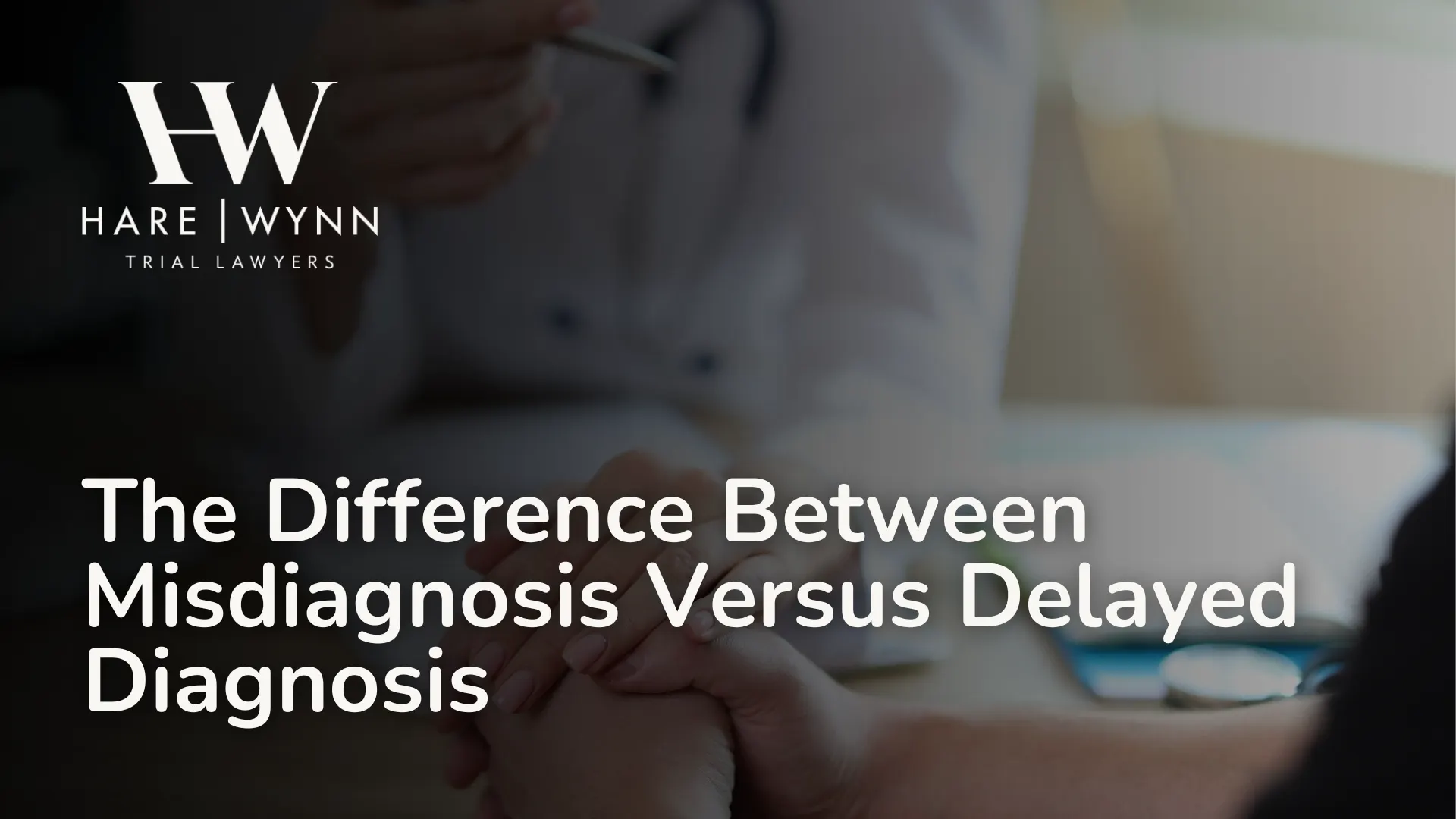When you visit a doctor, you trust that your symptoms will be taken seriously and properly evaluated. If your condition is misdiagnosed or your diagnosis is delayed, the results can be devastating.
At Hare Wynn, our medical malpractice attorneys have seen how these errors can change lives. In Alabama, both misdiagnosis and delayed diagnosis are among the most common grounds for malpractice claims. Understanding how they differ is an important first step if you suspect negligence has harmed you or someone you love.
What Is Misdiagnosis?
A misdiagnosis occurs when a healthcare provider gives the wrong explanation for a patient’s symptoms. In other words, the provider reaches the wrong conclusion.
This might mean:
- Diagnosing one illness when the patient actually has another (for example, mistaking cancer for an infection).
- Overlooking a condition entirely.
- Prescribing the wrong treatment or unnecessary procedures that may cause more harm than good.
The consequences of a misdiagnosis can be severe. Patients might receive medication that worsens their conditions, undergo risky surgery they don’t need, or miss the chance for early intervention that could save their lives.
In Alabama, whether misdiagnosis rises to the level of malpractice depends on whether the provider failed to act as a reasonably competent professional would under similar circumstances. An experienced Alabama medical malpractice lawyer can review your records and determine if negligence was involved.
What Is Delayed Diagnosis?
A delayed diagnosis occurs when the correct condition is eventually discovered, but not in time to prevent additional harm.
Delays often happen when a provider:
- Fails to order the right diagnostic tests.
- Misinterprets test results.
- Dismisses or minimizes a patient’s reported symptoms.
Timing matters in medicine. A delay in recognizing a heart attack, stroke, infection, or cancer can mean the difference between full recovery and lifelong complications, or even death. Like misdiagnosis, delayed diagnosis may be medical malpractice if a reasonable doctor in the same situation would have acted sooner.
Misdiagnosis vs. Delayed Diagnosis: Key Differences
- Misdiagnosis: The wrong answer. The patient is treated for something they don’t have.
- Delayed Diagnosis: The right answer, but too late. Treatment starts only after the condition has advanced.
Both can result in serious harm, both may be grounds for a malpractice claim in Alabama, and both require careful legal and medical review.
How Alabama Law Handles These Claims
Medical malpractice claims in Alabama are governed by the Alabama Medical Liability Act (AMLA). To succeed, patients must show:
- A doctor-patient relationship existed.
- The provider failed to meet the standard of care.
- That failure caused injury.
- The injury resulted in actual losses, such as medical bills, lost income, or pain and suffering.
It’s important to act quickly. In most cases, Alabama law gives you two years from the date of the malpractice to file a claim. Missing the deadline can mean losing your right to recover compensation.
Steps to Take if You Suspect Misdiagnosis or Delayed Diagnosis
If you believe a medical error has harmed you or a loved one, consider these steps:
- Prioritize your health. Seek care from another provider to get the correct treatment.
- Request medical records. These include test results, imaging scans, prescriptions, and doctor notes.
- Keep documentation. Write down what happened, including dates, names, and symptoms. Save medical bills and evidence of lost income.
- Avoid discussing details publicly. Social media posts can be used against you.
- Consult with an experienced attorney. Medical malpractice cases are complex and often require expert testimony. A medical malpractice lawyer can evaluate your case and handle the legal requirements.
Damages Available in Alabama Malpractice Cases
If your claim is successful, compensation (known as damages) may cover:
- Economic losses: past and future medical bills, lost wages, diminished earning capacity.
- Non-economic losses: pain and suffering, emotional distress, loss of enjoyment of life.
Wrongful death claims: Alabama law is unique in that only punitive damages (meant to punish wrongdoing) are available in these cases.
Because each case is different, the amount and type of damages depend on the specific harm you’ve suffered.
Contact Hare Wynn Today
Both misdiagnosis and delayed diagnosis can change a patient’s life forever. If you suspect either has happened to you or someone in your family, you don’t have to face the situation alone.
The medical malpractice attorneys at Hare Wynn have been helping Alabama families for more than 125 years. We understand the challenges these cases bring, and we’re committed to helping clients pursue the justice and compensation they deserve.
Contact us today for a free, confidential consultation.
Frequently Asked Questions
- Can both misdiagnosis and delayed diagnosis be considered malpractice?
Yes. Both situations may be malpractice if a healthcare provider failed to act as a reasonably competent professional would have in the same circumstances, and that failure caused harm. - How do I know if my case qualifies as medical malpractice?
It can be hard to know on your own. A medical malpractice attorney can review your medical records, consult expert witnesses, and determine whether negligence played a role. - What if I eventually received the right diagnosis?
Even if the correct condition was found later, you may still have a claim if the delay worsened your health or limited your treatment options. - How long do I have to file a malpractice lawsuit in Alabama?
Generally, two years from the date of the malpractice. However, there are exceptions (such as when the injury wasn’t immediately discoverable), but most claims cannot be filed more than four years from the date of the error. - What damages can I recover in a misdiagnosis or delayed diagnosis case?
Damages can include medical expenses, lost wages, reduced earning ability, and pain and suffering. Punitive damages are the only damages available in death cases. Each case is different, and your attorney can explain what applies to your situation.



